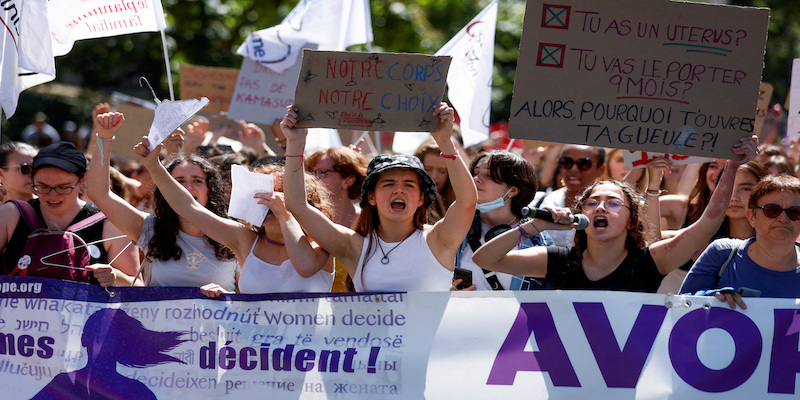
Why I Needed to Write About My Abortion
Pauline Harmange on the Saving Grace of Sharing Personal Stories
It’s an occupational hazard: when I had my abortion, I knew very early on that I would want and need to write about everything that had happened. Everything happening still. I needed time to understand what it was that I had (a personal story interspersed with reflections) and what I could not do (use this book as a personal journal). It wasn’t easy because for me, abortion landed precisely on this razor’s edge. So intimate, so deeply emotional, but also so political in reach.
Another occupational hazard is that I often wonder what story is being told, and especially why it is being told.
When I first began working on this text, only a few months after my abortion, I was furious. Furious that I was so unhappy and also alone. I thought that my loneliness was due to a singularity of situation. That no one else had ever experienced what I was experiencing—and that there wasn’t room for my experience.
I found the discourses on abortion incredibly binary. My stomach clenched when I watched anti-choice protests pass by, and my heart tightened when I thought of the first-hand stories gathered by feminists as a counterbalance. None of that was true, I said to myself, wrapped in my pain.
I wanted people to speak honestly about abortion; I was tricked by the crushing loneliness that was painfully difficult for me to navigate. Several months after the fact, I learned that before we speak more truthfully, even before that, we have to speak louder.
Even today, no one wants to listen to women who have had abortions. What happens in our bodies and in our minds when we choose to no longer be pregnant is still too distasteful, too sordid, and too shameful.
Even today, no one wants to listen to women who have had abortions. What happens in our bodies and in our minds when we choose to no longer be pregnant is still too distasteful, too sordid, and too shameful. They’d rather we just shut up. But it’s no longer fashionable to tell women to shut up, so if it’s truly necessary for us to open our mouths, then they’ll allow us to speak quietly, eyes locked on the ground, and without going into too much detail, if you’d be so kind.
I was a feminist before my abortion. When I wasn’t healing, emotionally, from the pain of the abortion, but I nevertheless felt obligated to tell everyone, “I’m feeling fine, thanks,” it took a while for me to identify what was underlying my response. I wasn’t doing fine, but you don’t say that, unhappy woman!
You don’t say—in a world where so many women can’t freely access abortions, in a world where at any given moment we know that this right can be taken from us—that you’ve had an abortion and ugh, frankly, it wasn’t great.
I confused my loyalty to feminism, which had given me so much and which suddenly felt so limiting under the circumstances, with what was really at play: the silence imposed on women who do what they want. When I said, “I’m doing fine”—when actually I wanted to cry—it wasn’t my feminism that was betraying me: it was the law of silence that perpetuates taboo.
I didn’t want to give those awful people even one more drop of fuel to add to their fire; I wanted to be worthy of this right that was so hard won and which is constantly being dragged back up for debate.
I’m writing my story to combat this loneliness, to join the chorus of voices speaking up about abortion.
It took some time for me to understand that it wasn’t feminism that was causing me to act like this. It’s not that I was being told to be fine; it’s that I was heeding the patriarchal command to fit inside a single box and not venture outside it. Because with abortion, like so many other subjects of debate that largely affect oppressed minorities, there is no room for complexity.
How better to honor the women who have fought for abortion rights, those who are still fighting around the world, those who have suffered from its illegality, those who still suffer from its limitations, than to continue to talk about it? I’m a feminist, but I have never had to fight for my right to access abortion.
So, I grew up naively (I believe) thinking that here in France, at least, it was almost a non-subject. A right like any other, a mundane procedure barely worthy of notice. In fact, it’s the opposite. It’s a subject that sparks incomprehension, hate, and loneliness.
I’m writing my story to combat this loneliness, to join the chorus of voices speaking up about abortion. I’m writing for the young woman I was when I typed “personal abortion story” into the Internet search engine, and for the one who will do the same thing today. Who will, like I did, land on a disguised anti-choice propaganda website, before finally accessing information that is objective, medically informed, and honest.
I’ve spent so much time talking about my abortion to other women, head held high, so much time recognizing my sisters in this life experience. I’m writing this to say everything that the burden of taboo prevented me from understanding earlier, slowing my healing process. To bring us closer to the light.
______________________________

Abortion: A Personal Story, A Political Choice by Pauline Harmange is available via Scribe.
Pauline Harmange
Pauline Harmange (born 1995) is the author of I Hate Men and Abortion: A Personal Story, A Political Choice. She is a French feminist writer and self-declared misandrist who became the subject of international news coverage after her 96-page essay, I Hate Men sold out its press run after a French governmental official attempted to censor the book. She lives in Lille.



















